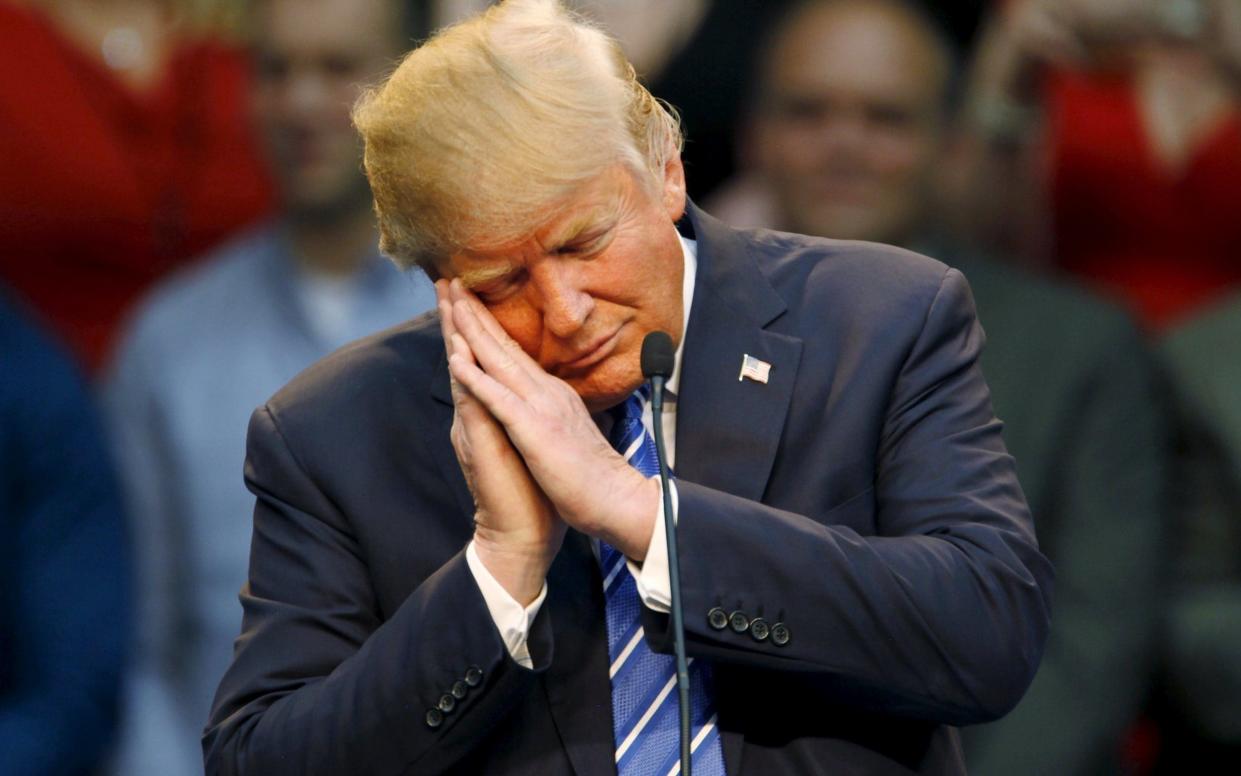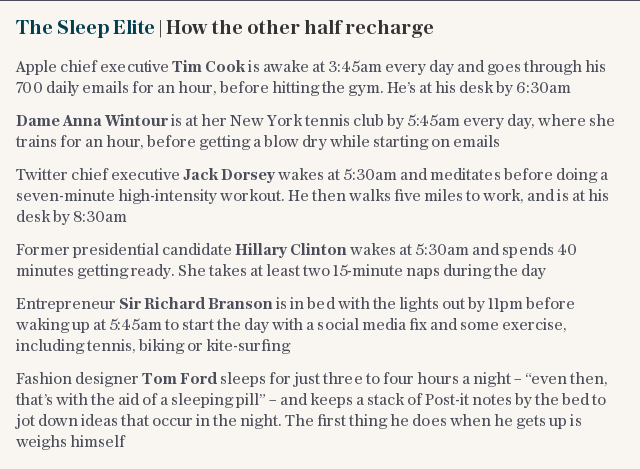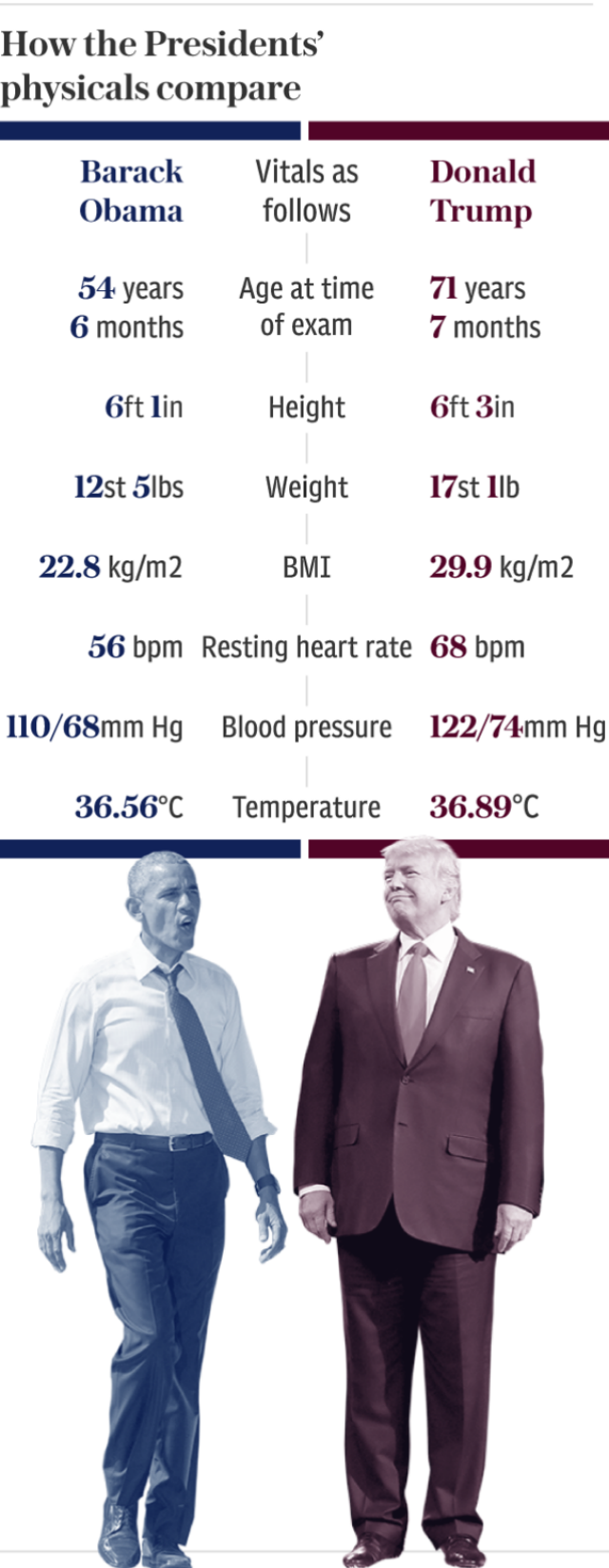Can you really be successful on four hours a night sleep?

Following Donald Trump recent annual medical assessment, his doctor proudly proclaimed the president scored perfectly in his cognitive tests and only needs four to five hours of sleep a night.
‘He’s just one of those people, I think, that just does not require a lot of sleep,’ said his White House physician, U.S. Navy Rear Admiral Ronny Jackson, adding: ‘He’s probably been that way his whole life. That’s why he’s been successful.’
Trump, of course, is not the only world leader known for getting by on little sleep. Former prime minister Margaret Thatcher was known for sleeping four hours a night; in 2016 the New York Times reported then-President Obama slept for five hours, as did Bill Clinton who, during his presidency, was known for calling staff well into the early hours.
Outside of government, Apple CEO Tim Cook wakes at 3.45am and US Vogue editor Dame Anna Wintour arrives at her New York tennis club before 6am. The Wall Street Journal once dubbed these types the ‘sleepless elite’, under the headline, ‘Why Some People Can Run on Little Sleep and Get So Much Done’.
This was after scientists found around 1% of the population are natural ‘short sleepers’, meaning they are early birds and night owls rolled into one. And hugely successful ones at that.
One study from the University of Pittsburgh suggested some short sleepers could have hypomania, which involves racing thoughts and few inhibitions. ‘These people talk fast. They never stop. They’re always on the up side of life,’ says Dr. Daniel Buysse, a psychiatrist at the university who led the study.
However, Dr Buysse also says that out of every 100 people who think they’re short sleepers, only five actually are. The remaining 95 are just kidding themselves – and severely sleep deprived.
Short sleepers could have hypomania, which involves racing thoughts and few inhibitions
‘Some people are naturally short sleepers,’ says sleep expert Neil Stanley. ‘Sleep is like height – some of us are tall, some of us are short. Some people are long sleepers – and need around eight hours of sleep to function well – whereas others are short sleepers and need half that.
‘Your sleep needs are genetically determined and you can’t really change them. It’s possible that President Trump is a short sleeper. But it’s also possible he’s boasting. It’s like being asked by your GP how many units of alcohol you drink a week. There’s a temptation to give a number you think sounds impressive.
‘And not needing a lot of sleep does sound impressive. It implies you’re tougher, smarter, more successful, or hard working. But if you’re not a naturally short sleeper – and remember only a tiny percentage of people really are – then you’re going to end up short tempered and run down.’

However, there are other sleep scientists who are challenging the 8-hour rule that has been drummed into us as what is healthy. Instead, they argue that short bursts of sleep are much better for us. Winston Churchill famously took a nap every afternoon and elite sports sleep coach Nick Littlehales says napping could be the key for people, like Trump, who aren’t getting enough hours at night.
Sleep is like height – some of us are tall, some of us are short
‘Sleep is a mental and physical recovery process that we all need to function well,’ says Nick, who has sleep-coached the players of Manchester United, Chelsea and Real Madrid and is author of Sleep: The Myth of 8 Hours, The Power of Naps (Penguin). ‘However, as humans we’ve evolved away from the old way of going to sleep when it gets dark and waking when it gets light. We’re not all getting eight hours.
‘Each generation creates new lifestyles and the human body is continually able to adapt and cope with what’s it’s asked to do. For example, a new parent can survive on little and broken sleep. A single-handed round-the-world sailor can sleep in short bursts for the months at sea. Night shift workers, nurses and so on can cope on little sleep, and so can presidents and CEOs.
‘However, whether that’s the “right” thing to do? We’re still investigating that. On the one hand we have research that shows sleep is important and if you don’t sleep enough, for you, you’ll burn out and you can increase your risk of dementia and Alzheimer’s.
‘But certain people – presidents, parents, the CEO of a global company – these people have to remain alert for 24 hours a day. Some do it and feel fresh, fully motivated, alert and with their full beam on. But some do it and feel tired, rely on caffeine and sugar, and just about operate through the fatigue.’

And to those people, Nick suggests naps; ‘A lot of my athletes adapt to little sleep at night to napping when gaps appear in their schedule, although the best times for naps are midday and early evening.’
Nick also says that a lot of successful people who get up early probably go to bed early. And the ones who don’t probably adopt a similar approach to his athletes; It’s about marginal gains.’
In fact, a recent study from the University of California found napping right can give you the benefits of eight hours; ‘With naps of an hour to an hour and a half, you get close to the same benefits in learning consolidation that you would from a full eight hour sleep,’ said researcher Sara Mednick, who worked on the study.

Nick, who advises his athletes on the best hotel rooms, beds and even mattresses for sleep, also says that quality is every bit as important as quantity. He suggests black out curtains, a bedtime routine, a room temperature between 16-18c and limiting exposure to artificial light before bed.
‘You need three things for good sleep,’ says Neil Stanley, ‘a bedroom conducive to sleep, a relaxed body and a calm mind. You can’t sleep properly if you’re worrying, stressing or constantly arguing with people either in real life or online.’
So perhaps that’s the real reason behind Trump’s four hours…

 Yahoo News
Yahoo News 
